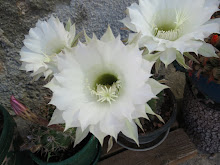Among those frozen unfortunates is my thyme plant. Whole summer we’ve been enjoying its’ sweet and pleasant odor, and it was a real treat to enrich herbal tea with few leaves of fresh thyme.
Thyme (Thymus vulgaris) is a smaller, bushy plant which doesn’t exceed

Thyme blooms through whole summer (from June to October) and it’s adorned with beautiful and strong smell. You can pick wholesome plant (without wooden parts) and dry it in a cool, clear place, on the attic, for example. When you dry it, it is recommended to use wooden or glass sticks instead of your bare hands.
Thyme has a very wide usage in popular medicine. You can use for clearing respiratory system; it smoothens coughing, hoping cough and nerves. Thyme tea mixed with honey helps women give birth, and it has positive effect on anemia, kidney diseases, women diseases and rheumatic troubles.
If you dip thyme into olive oil or brandy, it can act very favorable on bacterial lung diseases or intestinal diseases.
Thyme increases physical strength of patients, and in some older times, thyme baths were used for helping pulingly children.
Here’s a simple recipe for thyme tea that helps in curing problems with coughing, bronchitis, insomnia, lung catarrh, migraine, asthma, flatulence, stomach ulcer and diarrhea:
Put 1 spoon of thyme to 3 to
My personal recipe for wonderful herbal tea is as follows:
Take one spoon of a mixture of thyme, mint, calendula, fennel, sage and a little bit of fig tree leaves and add to

4 comments :
Thanks Sandra. I've always loved the fragrance of thyme and use it in cooking all the time. I didn't know how beneficial it is!
Sandra, thanks for sharing all this info. I really enjoy your posts. Thyme is another favorite herb for me. I had planted a seed which grew to be a plant in a pot out in my balcony. Often, I used it in my cooking, but I was saddened to see it had died when I got back from my vacation this summer. I need to plant a new one this spring. It's used frequently in Turkish cuisine, in fact many people in my city in Turkey pick thyme from the mountains. It smells great and is so good for you. Wonderful post.
Thank you both for comments - I must add that thyme is really one of my favorite herbs, and when I'm on my summer vacation (on the sea) I always find it growing wild, in the open (like many other cultivated herbs grow), and I really spend plenty of time walking around and picking up those herbs :-). I have it my garden, as a little bush, it survived last winter, and I truly hope it'll survive this winter as well.
Always a useful herb to have in the graden as I use it thyme and thyme again. sorry I couldn't resist! lol
Nice post and very useful at the same time. Thanks.
Post a Comment